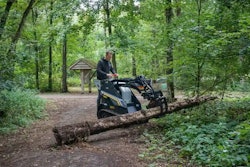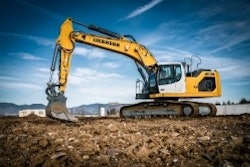“Go west, young man.”
Heeding Horace Greeley’s directive more than 100 years after it was given, 19-year-old Dave Heyl boarded a Greyhound bus in his hometown of Pittsburgh, Pennsylvania, and made a miserable 48-hour trip to the Eagle/Vail, Colorado, area.
Wife and business partner Kerri Heyl now says with a laugh: “He never wanted to go through that again, so he had to do something with himself here.”
Keeping a straight head
Heyl was lured to Colorado by a childhood friend who had bragged about all the construction going on in the area. Since he had worked construction in high school and afterwards, the move made sense to Dave, even though he admits to being a rookie.
“I was just learning, working as a laborer,” he says. He worked for a variety of general contractors in the area, including Continental West Constructors, where he got the core of his experience.
“A superintendent there kind of took me under his wing and made sure I had my head on straight,” Dave says, not an easy thing to do in a resort area where distractions abound. “I give a lot of credit to him because for two years he made me focus on what’s really important in the construction industry. He pointed me in the right direction.”
A whole lotta construction going on
Dave continued to advance through the ranks and was a foreman for an excavating company when he met Kerri on the job. “I was doing a job costing for the same company and would go out on his jobs to get his paperwork,” Kerri relates. She was also training foremen on how to properly use the job costing software the company had bought.
“They were just plugging in the hours machines would work at an hourly rate instead of accounting for the fact that those machines were running at most 40 to 50 minutes out of an hour,” she says.
The two decided to marry about the same time Dave got restless with his job. This restlessness is a common theme among emerging contractors. Many get to a point where they know they can do things better if given half a chance. In Dave’s case, he was dissatisfied with the direction his company was taking. It also was hard not to notice the giant opportunities surrounding him in a booming area. (In 1995 to 2000 alone, Eagle County saw a 31-percent population expansion. Dave estimates the average mountain home now costs around $6 million.) In other words, he got the itch.
“I got mad one day and said I’m going to start my own company,” recalls Dave. “I talked to a general contractor who told me he might give me a shot, and that was good enough for me.”
Dave freely admits to being a risk taker. “You’ve got to be aggressive,” he says, “and you have to create your own niche.” Working in the Vail Valley area gives excavating contractors an automatic niche, he claims. “We’re doing the same type of work as the next excavating contractor,” he says, “only we’re doing it on the side of a mountain. It changes the way you do excavating 180 degrees. It’s hard to teach. You almost have to get in there and figure out yourself how to do it.”
The rewards are also there. While the average contract for an excavating contractor in a traditional neighborhood would be around $15,000, for a home perched on the side of a mountain that amount can easily ratchet up to $150,000. “It’s not that you’re making obscene profits,” Dave says, “it’s just that it takes a lot of extra work.”
$2 million in three years
Even though the area’s straight-line growth seemed to die down just as Dave and Kerri took their big leap in 1999, the decrease hasn’t kept them from their own growth spurt. In three years the company has grown from an annual volume of $337,000 to $2 million.
“Even with all of these fancy homes going up,” Dave says, “we’ve felt the recession. It used to be you could charge whatever you wanted.” He laughs: “That started going away when we started our company.”
Dave and Kerri say they fend off competitors with quality. “We try to give our clients service that they’ve never had before,” Dave says. “If I end up having to do something three times because a client wants to change it, I won’t charge them for it, because I know I’ll get their next job in return. Happy customers and referrals are our best form of compensation.” Kerri adds: “We don’t want anyone to say we didn’t do everything we could to make their project the best.
“We really saw that a quality contractor would be valued around here. As you can imagine, this area attracts a lot of fly-by-night contractors.” The terrain usually defeats them, however, with earth layers that switch from bedrock to shale to granite to gyp dirt, a substance Kerri compares to hardened talcum powder. “It usually ends up eating their lunch,” Dave says. Sometimes they work in areas so out of the way that when they call for utility locates, “it isn’t even on their maps,” Kerri says.
The two have had their own growth curve, especially when it came to business knowledge. “Neither of us knew anything about the business end of the industry,” Dave says.
The Heyls have since caught religion about controlling costs. “We use a software program that allows us to know all our costs,” Dave says. “I can break my rental costs down to the minute if I have to. I know my fuel costs and which operators can run which equipment at what production rate. It’s really allowed me to be competitive.”
Tools of the trade
Right off the bat, the company bought a Cat 320 excavator. “We didn’t use a rental purchase option on our first couple of machines because we weren’t educated in it,” Dave says. “But we’ve gotten up to speed since then.”
Heyl Country owns a collection of excavators, compact excavators, skid steers and a loader, much of it attained through rental purchase options. And they just bought their first truck equipped with a low boy. “Even though there’s a lot of contract trucking around here it seemed as if I was always waiting on someone to move a machine when I could be making money,” Dave says.
The Heyls have no equipment yard, opting to keep their equipment on their jobs. With land prices so high in the area, they figure the land alone for a shop/yard facility would cost them at least $500,000 – money they’re presently unwilling to add to their overhead.
This arrangement still has its costs, though, since they rely on their dealer to provide all their preventive maintenance work. And their machines are just getting to the point now where they are old enough to start having maintenance issues. “We’re doing some research to see if it’s worth doing our own maintenance,” Dave says. It’s a decision the two will make carefully. He knows he has one less thing to worry about with his dealer taking care of all his maintenance, including oil sampling. On the other hand, the costs are mounting. Plus there’s the staffing issue.
“I’ve got a good operator who could probably do our maintenance, but then I’d have to pull him away from job production,” Dave says. And finding good people who will stay is another matter in this high-cost-of-living resort destination. “People are only here for maybe a year or six months and many of them are just looking for a paycheck. I’m envious of contractors who have people who’ve worked for them for 10 or 20 years. We’re fortunate in the people we have, but just trying to maintain them is difficult.”
One thing he’s far removed from these days is the operator’s seat. “I haven’t operated the machinery in the past couple of years,” Dave says, “because there’s just no time. We’ve grown to the point where I’ve got to be in the office bidding and then out managing the jobs and keeping people happy. Public relations is a full-time job.”
Aggressive creation
Kerri calls the developers Heyl Country works with “visionary.” “When you get into the back country you can see what they had to start with,” she says, “and then to be able to turn it into the developments they build is amazing. It’s exciting to work with them because they’re all motivated and really aggressive at creating something.”
The accolades are tossed back at them. “They’ve done a great job for us,” says Matt Vogt with developer client Architectural Impact. “They’ve jumped in, they have the right numbers and they put the right guys on their jobs. I appreciate everything they’ve done for us.”
Dave and Kerri have earned a good reputation in the community, says Moffett Settle with Weaver General Construction. “They take good care of their equipment, keeping it clean and up to date,” he says.
“Other competitors know they have a stiff competitor in Heyl Country,” adds material supplier Jim Kemp with Kemp and Company.
Keeping up with the growth
“We’ve already got $1.6 million on the books for 2003 and we could grow a lot bigger, but we’ve got to watch it,” Dave says. “Up to this point, when we’ve doubled in size it’s been fine, but now it represents a big chunk.”
“We’re aware that you can grow yourself out of business,” Kerri says. “I can see how you can do it. Maybe sometimes the greatest thing would be not getting a contract.”
One person who has every confidence they’ll be able to manage whatever comes their way is Gerry Salani, their salesman for Wagner Equipment, and one of the people to whom Dave and Kerri went when they were considering the idea of going into business. “They are professional and wonderful people to deal with,” he says. “They’ve built a wonderful business from nothing to become a major player. They give it their personal touch and that’s helped them grow. People want to deal with the owner and they couldn’t get that from the big companies anymore. They can from Dave and Kerri. They’re on their jobs and you can talk to them. They’re always honest and upfront and tell it like it is.”






